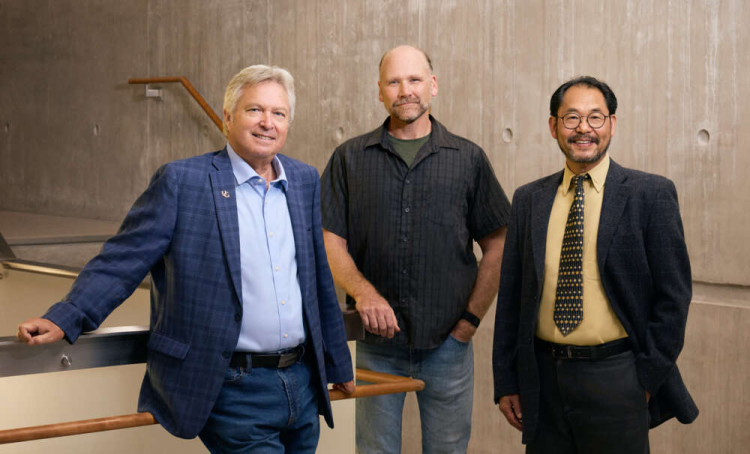University of Guelph researchers have been honoured with prestigious federal awards from the Natural Sciences and Engineering Research Council of Canada (NSERC) for research that has had exceptional benefits for Canada and Canadians alike.
Dr. Beth Parker, professor in the Department of Civil, Environmental and Water Resources Engineering, College of Engineering and director of the University's Morwick 360 Groundwater Research Institute is one of only two in Canada to receive the NSERC Donna Strickland Prize for Societal Impact of Natural Sciences and Engineering Research this year.
Dr. Mike Dixon, professor emeritus in the School of Environmental Sciences (SES), Ontario Agricultural College and director of the University's Controlled Environment Systems Research Facility, and colleagues Drs. Youbin Zheng and Thomas Graham, SES, have received the NSERC Synergy Award for Innovation.
The University of Guelph is the only university to receive two NSERC prizes in 2025. This is the first time a University of Guelph researcher has been awarded the Donna Strickland Prize, and the fifth time a U of G researcher has received a Synergy Award for Innovation since 2018.
"I am incredibly proud of our researchers for being recognized with these prestigious NSERC awards," says Dr. Shayan Sharif, interim vice-president research & innovation. "These honours not only celebrate individual excellence but also reflect the collaborative spirit and dedication to societal impact that define our research community here at U of G."
"The University of Guelph continues to innovate and deliver effective solutions by leading research into real-world challenges," says Guelph MP Dominique O'Rourke. "The research of Dr. Beth Parker in the field of groundwater and the research of Drs. Dixon, Zheng and Graham around vertical farming and sustainable agriculture are guiding solutions for some of the most pressing issues for Canada and beyond. It is incredible to see the innovation at the University of Guelph and how their remarkable researchers continue to improve life."
These awards are part of the 2025 NSERC Prizes announcement made last week by Alejandro Adem, president of NSERC, to recognize the outstanding research contributions of 28 individuals (19 researchers and 9 industry partners) with prizes totalling $4.05 million.
The researchers will receive their awards at a ceremony in Ottawa on Nov. 5.
Donna Strickland Prize for Societal Impact of Natural Sciences and Engineering Research
Started in 2020, the NSERC Donna Strickland Prize for Societal Impact of Natural Sciences and Engineering Research is awarded annually to an individual or team whose outstanding research, conducted in Canada in the natural sciences and engineering, has led to exceptional benefits for Canadian society, environment and/or economy. Winners of this award receive a $250,000 research grant over three years.

Dr. Beth Parker (Sylvie Li / Shoot Studio)
Dr. Beth Parker, College of Engineering
"My field-based research program is conducted at real contaminated sites and within communities that rely on groundwater for drinking water," says Parker. "It involves direct engagement with regulators and decision-makers, and rapidly translating research findings to inform actions that protect public health and freshwater resources. It is immensely rewarding to see this work contribute to positive outcomes at the community level. This award recognizes collective efforts of a large team of talented staff and graduate students over several decades, and our strong collaborations with industry professionals."
Parker is a leading hydrogeologist who has revolutionized how we protect one of Canada's most important freshwater resources: groundwater.
Her research has reshaped understanding of how contaminants move through fractured bedrock aquifers (underground water sources) where they can remain for decades or longer. She was the first to discover how pollutants stored in certain areas can slowly re-enter groundwater, explaining why traditional cleanup methods often fail and informing the creation of smarter, more sustainable remediation strategies.
Two of her most transformative discoveries, COREDFN and the "golden spike" approach, are tools that enable high-resolution monitoring and predictive modelling of groundwater systems. Parker's methods have been adopted by municipalities, engineers and policymakers around the world to determine risks, guide remediation efforts and protect drinking water, especially in rural and Indigenous communities.
With increasing pressure on aquifers from climate change and urbanization, Parker's discoveries continue to guide development of groundwater protection efforts and help safeguard the world's clean water supplies.
Synergy Award for Innovation
The Synergy Awards for Innovation are annual awards that recognize examples of collaboration representing models of effective partnership between academic institutions and partner organizations. Winners receive a $200,000 research grant.

Drs. Mike Dixon, Thomas Graham and Youbin Zheng (Sylvie Li / Shoot Studio)
Drs. Mike Dixon, Youbin Zheng and Thomas Graham, Ontario Agricultural College
"Based on technology requirements for supporting human space exploration missions with reliable food production in such harsh environments as the Moon and Mars, our collaboration with Intravision Light Systems Canada has yielded innovative solutions in controlled environment agriculture uniquely suited to technology transfer to the Canadian agri-food industry sectors."
Dixon and his team are helping to make food production more secure and sustainable. With fellow professors Youbin Zheng and Thomas Graham, and industry partner Intravision Light Systems Canada, the team has developed tools that enable efficient, high-yield farming in both urban centres and remote areas.
Their Photosystem Chambers , developed at U of G, are highly customized, controlled environments that simulate precise growing conditions which allow researchers to study plants and their interactions with their environment to ultimately improve crop yields. The team has integrated lessons learned in the chambers with Intravision's GravityFlow vertical farming system to create a fully automated, multi-layer, controlled environment platform where food and medicinal crops can be grown year-round, at a commercial scale, regardless of climate or geography.
Grounded in a collaborative partnership between the University and Intravision, the project supports training of highly qualified personnel and research staff, and facilitates technology transfer and adoption by the controlled environment agriculture and vertical farming industries.













